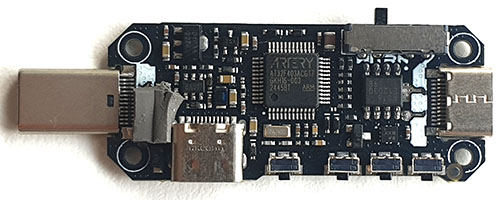Feed linux for devices [copy] http://www.linuxfordevices.com/rss-feeds-1.xml has loading error: cURL error 22: The requested URL returned error: 404
Feed SparkFun Electronics [copy] http://www.sparkfun.com/feeds/news has loading error: cURL error 22: The requested URL returned error: 405
Feed The RFID Weblog [copy] http://www.rfid-weblog.com/index.rss has loading error: cURL error 22: The requested URL returned error: 404 Not Found
ESP32-P4-PC board from Olimex offers HDMI and MIPI support
The ESP32-P4-PC is an embedded development board based on Espressif’s ESP32-P4 RISC-V processor. Developed by Olimex and measuring 90 x 60 mm, the board provides HDMI output, MIPI CSI and DSI interfaces, Ethernet, USB host ports, audio, storage, and expansion headers in a compact form factor. The design is built around the ESP32-P4NRW32 system-on-chip, which […]
Hackaday Links: March 1, 2026

We’ll start this week off with a bit of controversy from Linux Land. Anyone who’s ever used the sudo command knows that you don’t see any kind of visual feedback while entering your password. This was intended as a security feature, as it was believed that an on-screen indicator of how many characters had been entered would allow somebody snooping over your shoulder to figure out the length of your password. But in Ubuntu 26.04, that’s no longer the case. The traditional sudo binary has been replaced with a one written in Rust, which Canonical has recently patched to follow...
Expert Beginners and Lone Wolves will dominate this early LLM era
After migrating this blog from a static site generator into Drupal in 2009, I noted:
As a sad side-effect, all the blog comments are gone. Forever. Wiped out. But have no fear, we can start new discussions on many new posts! I archived all the comments from the old 'Thingamablog' version of the blog, but can't repost them here (at least, not with my time constraints... it would just take a nice import script, but I don't have the time for that now).
CHUWI CoreBook Air Plus 16 review – Part 3: Ubuntu 25.10 on a mid-range AMD Ryzen 5 6600H laptop

We’ve already checked CHUWI CoreBook Air Plus 16 hardware in the first part of the review, before testing the AMD Ryzen 5 6600H laptop with Windows 11 Pro, and today I’ll report my experience using the CoreBook Air Plus 16 laptop with Linux using Ubuntu 25.10 distribution. The Ubuntu review will include system information, benchmarks, YouTube 4K and 8K video playback, feature testing, storage and WiFi 6 performance, and measurement of fan noise and power consumption/battery life. Ubuntu 26.04 vs Ubuntu 25.10 installation The initial plan was to install Ubuntu 26.04 (daily image) on the laptop in dual boot configuration...
LILYGO Unveils RISC-V ESP32-P4 T-Halow Board and ESP32-S3 E-Paper S3 Pro Lite
LILYGO has released two new ESP32-based products: the T-Halow P4, a compact development board built around Espressif’s ESP32-P4 RISC-V SoC with integrated Wi-Fi HaLow support, and the T5 E-Paper S3 Pro Lite, a 4.7-inch ESP32-S3 e-paper device positioned as a simplified version of the Pro model introduced in 2024. The T-Halow P4 is built around […]
Simple Screw Counter

[Misc] Laser-cut dispensers of nuts and bolts
ESP32-C5 bug advisory identifies and fixes PSRAM and sleep coexistence issues

Espressif Systems has just published a bug advisory for ESP32-C5 chips that identifies and fixes three bugs related to PSRAM and sleep coexistence stability. New microcontrollers often have issues when they are first released, leading companies to issue errata listing bugs and potential fixes, as we’ve previously seen with the Raspberry Pi RP2350 A4 stepping, which fixes the E9 GPIO Erratum with a new revision of the silicon. Espressif identified three issues with the ESP32-C5: PSRAM Reset Hang – When ESP32-C5 series chips run ESP-IDF v5.5.1 with PSRAM enabled, CPU or digital reset operations may hang. This triggers a secondary...
Upgrading my Open Source Pi Surveillance Server with Frigate

In 2024 I built a Pi Frigate NVR with Axzez's Interceptor 1U Case, and installed it in my 19" rack. Using a Coral TPU for object detection, it's been dutifully surveilling my property—on my terms (100% local, no cloud integration or account required).
I've wanted to downsize the setup while keeping cheap large hard drives1, and an AI accelerator.
M5Stack Unit PoE-P4 – A tiny PoE-powered ESP32-P4 development kit with MIPI DSI/CSI and USB-C connectors

The M5Stack Unit PoE-P4 is a tiny, PoE-powered development kit built around the ESP32-P4NRW32 SoC. The module integrates a 10/100Mbps Ethernet PHY, supports IEEE 802.3at PoE for single-cable power and data, and provides MIPI DSI/CSI display and camera interfaces. It’s designed as a network-enabled node with built-in PoE (up to 6W output), a USB Type-C host port, and a separate USB Type-C OTG/download interface, along with an RGB LED, IR transmitter, user button, Grove (HY2.0-4P) port, Hat expansion header, and SDIO/ISP expansion interfaces, making it suitable for industrial HMI panels, PoE smart terminals, camera/vision acquisition nodes, smart home controllers, and...
Name that Ware, February 2026

This month’s Ware is shown below:
Do I sense a theme? Welcome to the tour of the various little gadgets I have littered around my desk for test & measurement!
This one is likely to be guessed pretty quickly as well, but a shout-out to Ole for introducing me to this little gem. It’s pretty impressive the amount of features & diagnostics packed into this tiny package. It’s not the cheapest tool, but a good tool – and I have to say I strongly agree with many of the product designer’s technical and aesthetic choices. The build quality is definitely up there.
I...